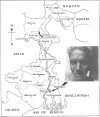Abstract
Following resurgence in Bihar of epidemic kala-azar, outbreaks of the disease were identified simultaneously in two separate foci about 500 km apart in West Bengal in 1980. While the outbreak in one of these foci, in northern West Bengal, was the result of a direct extension of the Bihar epidemic, the source of parasite in the other (in the village of Bandipur in the south of West Bengal) remained unknown until a case of nodulo-ulcerative post-kala-azar dermal leishmaniasis (PKDL) was located in the village. The continued presence of this case in the village from a time long before the outbreak aroused strong suspicion about its causal role. Laboratory-bred female Phlebotomus argentipes sandflies were allowed to feed on four cases of PKDL, including the case from Bandipur, to determine the transmission potential of these cases. Of a total of 400 flies in the experiment, 104 (26%) fed on the cases, and of these flies 44 died (31 within 48 hours of feeding). Of the surviving 60 flies, 32 developed promastigotes in the mid-gut. In view of the presence of the case of PKDL in the village prior to the outbreak and the availability of a susceptible human population and vectors, it is possible that the patient with PKDL was a source of Leishmania donovani parasites for the local focus. Furthermore, PKDL may act as a reservoir of parasites during inter-epidemic periods.
Full text
PDF





Images in this article
Selected References
These references are in PubMed. This may not be the complete list of references from this article.
- Bhattacharya A., Ghosh T. N. A search for Leishmania in vertebrates from kala-azar-affected areas of Bihar, India. Trans R Soc Trop Med Hyg. 1983;77(6):874–875. doi: 10.1016/0035-9203(83)90313-9. [DOI] [PubMed] [Google Scholar]
- Bray R. S., Ashford R. W., Mukherjee A. M., Sen Gupta P. C. Studies on the immunology and serology of leishmaniasis. IX. Serological investigation of the parasites of Indian kala-azar and Indian post-kala-azar dermal leishmaniasis. Trans R Soc Trop Med Hyg. 1973;67(1):125–129. doi: 10.1016/0035-9203(73)90330-1. [DOI] [PubMed] [Google Scholar]
- Gupta P. C. Leishmaniasis in India. J Indian Med Assoc. 1968 Jan 1;50(1):34–36. [PubMed] [Google Scholar]
- Le Blancq S. M., Peters W. Leishmania in the Old World: 4. The distribution of L. donovani sensu lato zymodemes. Trans R Soc Trop Med Hyg. 1986;80(3):367–377. doi: 10.1016/0035-9203(86)90320-2. [DOI] [PubMed] [Google Scholar]
- SEN GUPTA P. C. Observations on postkala-azar dermal leishmaniasis. Rev Bras Malariol Doencas Trop. 1956 Jan;8(1):175–186. [PubMed] [Google Scholar]




